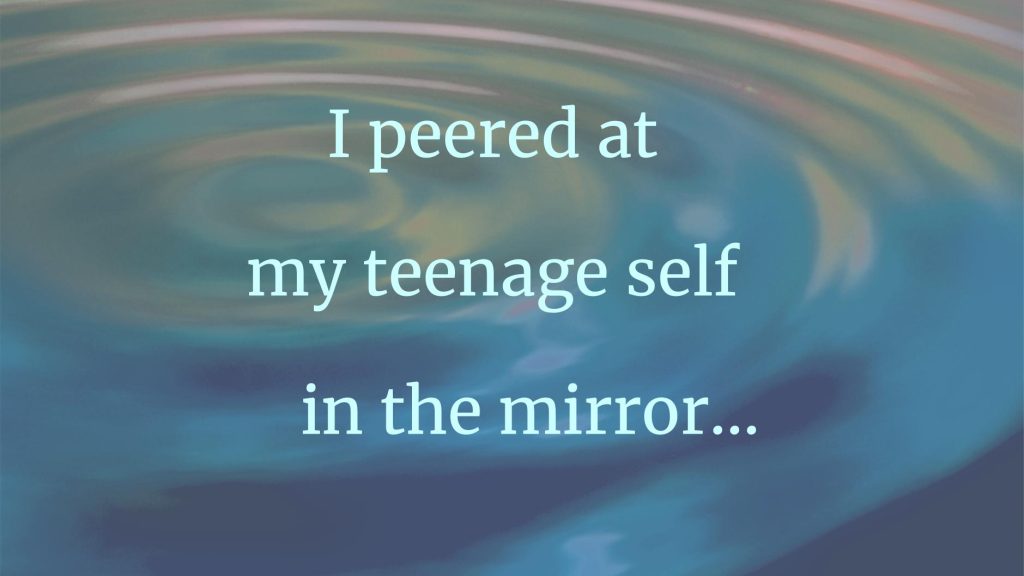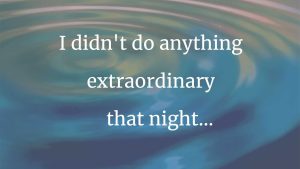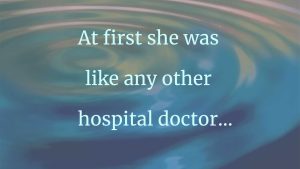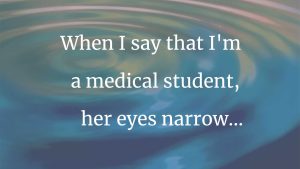Editor’s Note: This piece was awarded an honorable mention in the Pulse writing contest, “On Being Different.”
“What’s wrong with you?”
The words cut through my mind and hit me in the gut. My fragile fifteen-year-old ego splintered like a glass cup slipping through fingers onto hardwood.
Tears welled up, and my lips pursed, ready to respond. But I couldn’t find the words—for in that moment, I truly knew that I was broken, I was ugly, I was wrong. And even my mother knew it.
It started so innocuously: A stupid old horror show that I didn’t want to watch. But as the werewolf lurched across the screen, covered in patchy fake hair, my mother commented:
“Ugh, look at that unibrow! It’s so gross!”
Afterward, I went to the bathroom and peered at my teenage self in the mirror.
I don’t want to be gross…Do I have a unibrow?
To my horror, I saw a few dark hairs sprouting from the center of my brow. I reached up and, after several attempts, managed to pull them out with my fingernails. Looking at myself again, I felt a sense of relief.
Good: no more unibrow, no more hair. I’m not ugly.
Then the cycle began.
Every week or so, the hairs would re-sprout, and I’d pull them out again. Eventually I discovered my mom’s tweezers and used those when I could. Every time I pulled out a hair, it was a relief to know that I was fixing something—getting rid of the ugly parts of me.
I started to notice other eyebrow hairs growing slightly askew. I fixed those, too. At first it hurt, but after a few months there was no longer pain. In fact, I felt an oddly pleasurable sensation, almost a release.
I found myself absentmindedly picking at my hair while on the bus, during class, before bed. I started picking even the hairs that were in the right place. Within months, I’d picked away my eyebrows.
Oh, the shame of looking in the mirror and seeing visual confirmation that there was something wrong with me. A cycle of fear spun in my head like a miniature tornado, pushing aside other thoughts and consuming my day.
I look weird without eyebrows….What will happen when somebody notices? Then everyone will know I’m different, know how wrong I am.
I tried to stop, but the urge to pick was overwhelming, and often I’d finished before I knew that I’d begun. I tried to hide my habit, picking other parts of my hairline or eyelashes, but I just accumulated more bald spots, and the fearful inner tornado kept on spinning.
I’ll never forget the day my mother noticed. In fact, she caught me red-handed, my fingers at my eyebrows. Eyes wide, she stared at me in horror.
“What’s wrong with you?”
Here it was: The dreaded confirmation that I was different. Her subsequent reactions—accusations, yelling, guilt-tripping—weren’t much better: “Why can’t you just stop? You were so beautiful….”
I stood silently, tears dripping down my cheeks, until she didn’t know what else to say and left me alone.
In the years that followed, silence became my only weapon. When I told my mother that I couldn’t control the picking, she responded, “Yes, you can. You just have to stop.” I learned that staying quiet was easier on my emotional health and self-image.
If I don’t answer her, I thought, maybe she’ll forget there’s something wrong with me. What if I do tell her the truth, that I’m different and wrong? How could anyone love someone like that—someone like me?”
When she brought it up with my primary-care doctor, I gave them both the silent treatment. My doctor didn’t press the issue, so professional help wasn’t part of the picture.
It took me more than a year to finally Google my compulsion. Trichotillomania: the urge to pull out your own hair. Even the medical term sounded judgmental.
Mania, I thought. Great, so now I have a psychotic disorder, too?
In college, I transferred the picking to my eyelashes, which was easier to conceal. It was my secret—the knowledge that I was broken, and that no one could love the ugly, different person I was.
Once in a while, I’d suffer the horror of hearing an observant person say, “Hey, what happened to your eyelashes?” I’d mutter an excuse, then run far, far away. They never asked a second time.
My interests turned to medicine, and I was accepted into medical school. In a way, the torrent of medical information that I absorbed became a type of exposure therapy. Especially the psychiatry lectures: Images of balding scalps and gastric trichobezoars (balls of swallowed hair or other indigestible material, found in the stomach) reassured me that I was a relatively mild case. I still couldn’t confront my picking, but I felt comforted that I wasn’t alone.
One day, a classmate presented a patient with trichotillomania. In that moment, I felt like a scared teenager again, my ugly truth exposed to the world. I wasn’t sure if the glances my way were real or imagined, but as soon as the lecture ended, I raced home and wept.
It was then that I decided to seek treatment rather than repeat the shame spiral. My classmate’s patient had done well with hypnosis, so I booked an appointment with a local practitioner.
While hypnotherapy wasn’t terribly effective for me, it was the first step toward a crucial self-revelation. Looking inward, I acknowledged my difference and how it made me feel—that I was broken and ugly, with my hair-pulling acting as both a response to and a relief from this torment, while also adding an extra layer of shame.
I challenged those feelings and imagined my terrified fifteen-year-old self saying to my mother the words I hadn’t known how to say at the time:
“I’m not broken, and I’m not wrong. We’re all different, and I am a beautiful person. I deserve to be loved, regardless of my ‘bad habits’ or my physical appearance.”
The first time I said this out loud, I wept. The words were simple, but they spoke my truth: I was different. And that was okay.
Ironically, ten years later, I still have no eyelashes. I still pick them regularly, and what grows back isn’t robust. But I’m no longer burdened by the fear of being different. My husband isn’t bothered by my picking, and my kids equate it with their own nail-biting. In fact, my past struggles with trichotillomania help me to empathize with my patients’ struggles, especially related to mental health, and to give them more compassionate and holistic care.
Despite this emotional journey, I still haven’t shared my story with anyone outside of my immediate family. Recently, however, I experienced a workplace moment that I’d long worried about.
At the end of a busy day, a patient grasped me by the hands to thank me. Peering into my eyes, he paused, then said, “I’m sorry if this is personal, but may I ask what happened to your eyelashes?”
I froze. My mind flashed back to my mother, then to my college classmates, then to medical school, then to my kids. Rather than the inner tornado of shame, I felt a mere gust that quickly died.
I smiled, then said the words that I’d long needed to say aloud:
“It’s okay to ask. Yeah, it’s a bad habit of mine, kind of like nail-biting. I pick my eyelashes. It was my way of coping with stress for years. Maybe one day I’ll kick the habit—we’ll see.”
And in that moment, it felt normal to be different.








5 thoughts on “What’s Wrong With You?”
Hi Jessica! I don’t know if you remember (since this is a year too late lol!) but I wrote a similar story about trichotillomania on here that you left a beautiful comment on. I just finally saw your comment and your story as well and I am so touched and just teared up! I am a college student at Duke now and have had it control for a year or two now but when the urges come they are quite bad. I would love to talk more to you if there’s any way I can get any contact information of yours. Thank you so much for helping me feel related to for the first time in the last 7 years regarding my trichotillomania.
My “what’s wrong with you?” was cutting. It was a plea for help turned into shame and humiliation. Thank you for writing this part of your story.
I deeply admire you. I wish that what makes me feel different also made me feel normal. You are a strong, beautiful person.
Thank you for this.
I’m glad you reached the step of self acceptance.isn’t that more important than anything? Thanks for sharing your story.